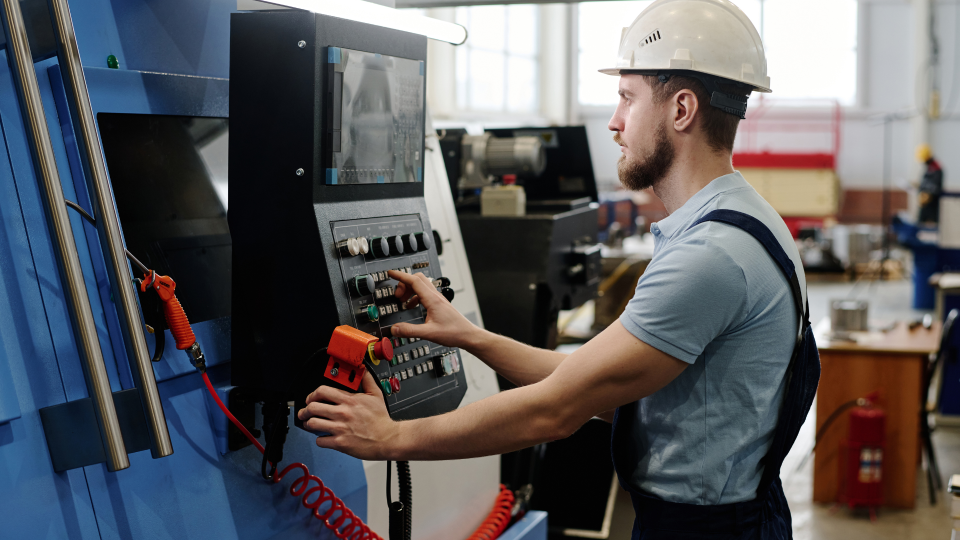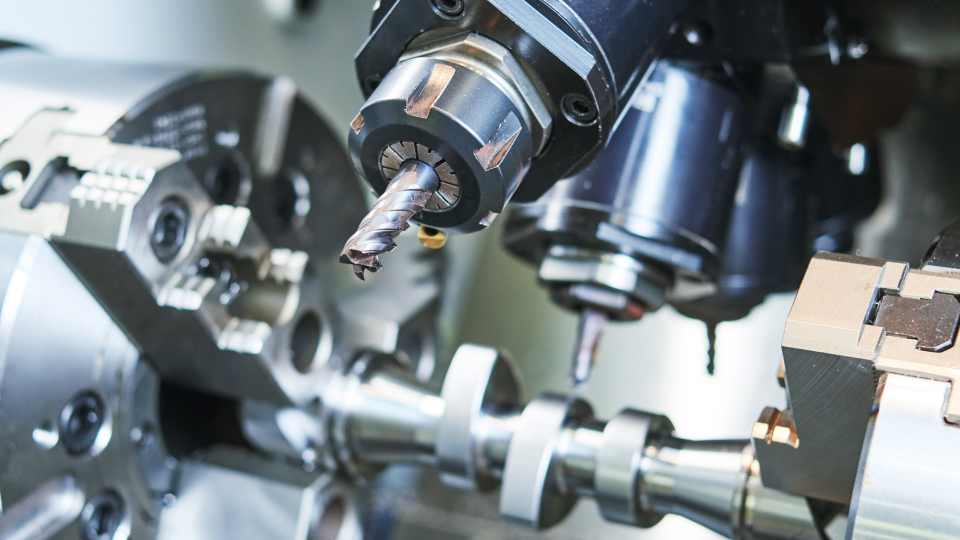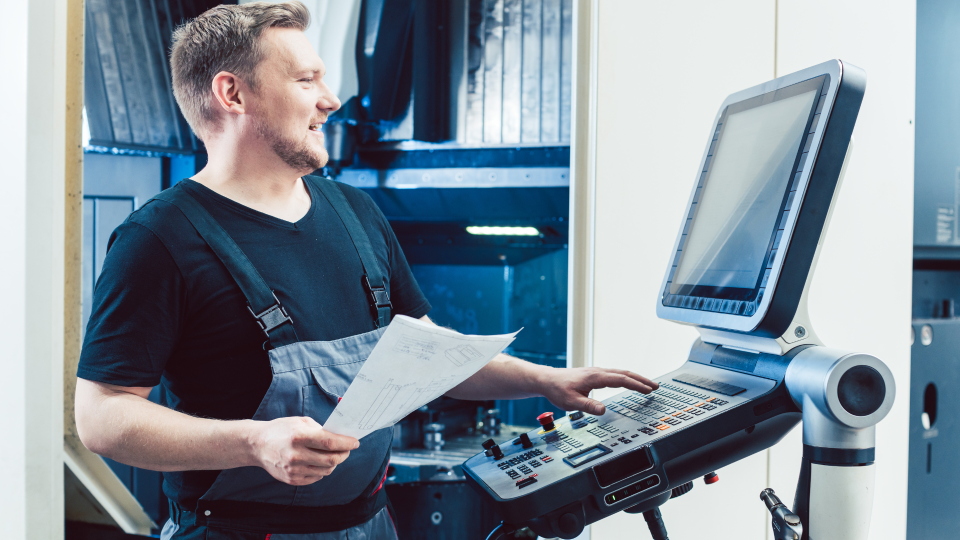A CNC technician programs, operates, and maintains Computer Numerical Control machines that manufacture precision components for a wide range of different industries. Working with sophisticated equipment like mills, lathes, and grinders, these skilled professionals turn digital designs into physical parts with accuracy measured in microns.
The role sits at the heart of many branches of manufacturing, producing components for aerospace, automotive, medical devices, and defence sectors. For anyone considering a career in engineering, CNC machining offers clear progression routes, competitive salaries, and the satisfaction of creating tangible products that matter.
What Does a CNC Technician Do?
CNC technicians spend their days reading technical drawings, setting up machines, writing or modifying programs, and checking finished components meet exacting specifications. The work combines digital skills with hands-on manufacturing knowledge.
Your morning might start by interpreting a Computer Aided Design (CAD) model to understand the component you need to produce. You'll select the right cutting tools, calculate speeds and feeds, then either write the program yourself or modify an existing one. Before running a full batch, you'll "prove out" the program - running it slowly to check for errors that could damage expensive materials or machinery.
Once production begins, you monitor the process closely. You'll adjust settings in real-time if needed, perform quality checks using micrometers and vernier calipers, and troubleshoot any issues that arise. For critical components, you might use Coordinate Measuring Machines (CMM) to verify dimensions down to thousandths of a millimetre.
The machinery you work with varies. CNC mills cut shapes from blocks of metal using rotating tools. CNC lathes spin the workpiece while the tool removes material, creating cylindrical parts. You'll likely work across different machine types and control systems, with Fanuc, Heidenhain, and Siemens being the most common in UK workshops.
Understanding CNC Job Titles
The terminology can be confusing when you're starting out. A CNC operator loads parts and runs pre-programmed cycles - often called "button pushing" in the trade. A CNC setter or technician takes responsibility for the whole setup process: selecting tools, entering offsets, proving out programs, and conducting detailed inspections. A CNC programmer writes and optimises the code that controls the machines, often using CAM software to generate complex toolpaths from 3D models.
In reality, many workshops blur these distinctions. The modern CNC technician often combines setting and programming skills, making them far more valuable to employers. Moving into programming represents a significant step up in both responsibility and salary.

Working Conditions
CNC technicians work on factory floors or in specialist workshops. The environment depends on your industry, with traditional engineering shops feeling very different to the temperature-controlled clean rooms used for medical device manufacturing, where contamination control matters as much as precision.
Standard working weeks run up to 44 hours, but shift work is extremely common, with manufacturers run expensive machines around the clock to maximise productivity. You might work "continental shifts" - three 12-hour days, two days off, three 12-hour nights, then three days off. While the days are long, many technicians appreciate the extended time off this pattern provides.
Night shifts typically come with a premium, sometimes adding 30% to your base salary. Overtime is often available during busy periods, giving you control over your earnings. The trade-off is accepting unsociable hours and the physical demands of standing for long periods while maintaining intense concentration.
Safety is taken seriously. You'll wear steel-toe boots, safety glasses, and hearing protection. Metal working fluids can cause skin problems if poorly managed, so proper extraction systems and hygiene practices matter. Good housekeeping (keeping your work area clean and organised) directly affects both safety and the quality of components you produce.
Skills You Need
Technical mastery forms the foundation of CNC work. You need fluency in G-code and M-code, the programming languages that tell machines how to move. For advanced roles, proficiency in CAD/CAM software like Autodesk Fusion lets you generate optimised toolpaths from design files. Familiarity with different controller systems broadens your opportunities, as workshops use various brands.
Strong numeracy matters more than you might expect. Calculating speeds, feeds, and offsets requires mathematical confidence. Attention to detail separates good technicians from average ones - a misplaced decimal point can ruin expensive materials or damage machinery.
Problem-solving ability is perhaps the most valuable skill you can develop. When programs behave unexpectedly or machines develop faults, you need to diagnose the issue quickly and fix it. This analytical thinking, combined with genuine interest in how things work, keeps the job engaging throughout your career.
The work also demands soft skills. You'll collaborate with design engineers, quality teams, and supervisors. Being able to explain technical problems clearly or suggest process improvements matters. Time management keeps production schedules on track. Physical stamina and manual dexterity help during setup tasks and quality inspection.
Starting Your Career
The apprenticeship route is the most respected path into CNC machining. The Level 3 Machining Technician apprenticeship runs for 42 months, combining workplace training with formal qualifications. You'll typically earn while you learn, gaining the "time served" experience that many employers value highly. Entry requirements usually include five GCSEs at grades 9 to 4, including English and Maths.
The newer T-Level in Engineering offers another option. This two-year course includes an occupational specialism in Machining and Toolmaking, with at least 315 hours of industry placement. The curriculum covers modern topics like mechatronics and control systems, preparing you for digitally integrated manufacturing environments.
Some people start with college courses - a Level 2 or 3 Diploma in Engineering provides theoretical foundation before moving into hands-on roles. Others begin as engineering operatives, learning on the job while working towards formal qualifications.
Whichever route you choose, practical experience matters enormously. The best technicians combine theoretical knowledge from formal training with extensive workshop time where they've made mistakes, solved problems, and built genuine understanding of how machines behave.

Career Development
Progression in CNC machining follows a clear path. You start as an operator, learning to run machines safely and consistently. As you gain experience, you move into setting - taking responsibility for the entire setup process. From there, programming roles open up, offering both intellectual challenge and significant salary increases.
Specialising accelerates your career. Five-axis machining expertise is particularly valuable. These machines can move cutting tools across five axes simultaneously, producing complex geometries that simpler machines cannot handle. Aerospace and high-end automotive manufacturers need these skills desperately, and they pay accordingly. A skilled five-axis programmer can earn as much as (or more than) junior managers.
Industry expertise also increases your market value. Working with specific materials or meeting the demanding standards required for medical or defence components makes you harder to replace. Quality control offers another path, with roles focused on advanced metrology and ensuring components meet specifications.
Some technicians move into supervision, leading teams and driving production efficiency. Others prefer to deepen their technical expertise, becoming the person everyone asks when facing particularly challenging machining problems.
Experienced setters and programmers sometimes choose self-employment, offering specialist skills on a contract basis. This can be lucrative, particularly for complex projects like commissioning new machinery. However, you need to understand UK tax rules around IR35, which determine whether you're genuinely self-employed or should be taxed as an employee. This path suits experienced professionals who can command high day rates and are comfortable managing the business side of contracting.
Salary and Earning Potential
Entry-level CNC operators typically start around £26,000 annually. As you gain experience and move into setting roles, earnings rise to £29,000 to £33,000. The significant jump comes with programming responsibility - entry-level programmers average £35,000, with experienced specialists earning upwards of £40,000.
Shift premiums make a real difference to take-home pay. A 30% night-shift allowance can add thousands to your annual earnings. Overtime during busy periods provides additional income. Specialists with five-axis skills or CMM expertise command premium rates.
The progression from operator to programmer can see your salary nearly double over several years. This makes CNC machining one of the more financially rewarding technical trades, especially if you're willing to develop programming skills and work unsociable hours.

Industry Outlook
Demand for skilled CNC technicians remains strong. The UK manufacturing sector continues to need people who can operate and program sophisticated machinery, particularly as older machinists retire. This skill shortage works in your favour when negotiating salary or seeking new opportunities.
Automation is changing the industry, but not in the way many people fear. Rather than eliminating CNC roles, increasingly sophisticated machinery creates demand for technicians who can manage complex systems. When automated cells cost millions of pounds, the person who can keep them running efficiently becomes extremely valuable.
Future roles will involve more data analysis, integration of collaborative robots, and predictive maintenance. The skills that require human judgement (complex troubleshooting, spatial awareness, and program verification) remain difficult to automate. By developing these capabilities, you make yourself indispensable.
Growth sectors look particularly promising. Aerospace and medical device manufacturing continue expanding, both requiring high-precision components. The push towards electric vehicles and sustainable technologies creates demand for technicians skilled in machining new materials. Positioning yourself in these growing industries provides long-term career security.
Professional Development
Technology in CNC machining evolves constantly. New machines, updated software, and different materials mean continuous learning is part of the job. Staying up-to-date protects your career and increases your earning potential.
The most valuable training focuses on specific skills employers struggle to find. Advanced courses on Fanuc, Heidenhain, or Siemens controllers make you more employable. Learning sophisticated CAM software, especially for five-axis or mill-turn applications, opens doors to senior roles. If you're transitioning from manual machining, courses in reading engineering drawings, G-code programming, and precision measurement provide essential foundations.
Training options include manufacturer-run courses at places like DMG MORI or Mills CNC, in-house programmes from employers, and flexible online learning. The investment pays for itself through higher salaries and better job opportunities.
Is This Career Right for You?
CNC machining suits people who enjoy precision work and solving technical problems. The best technicians combine meticulous attention to detail with practical problem-solving ability. You need patience for repetitive tasks but also the adaptability to handle unexpected challenges.
The work provides tangible satisfaction. You're creating physical components that go into aircraft, medical equipment, or vehicles - products that matter. There's genuine craft in producing a complex part to exact specifications.
However, the career has trade-offs. Long shifts require physical stamina. High concentration for extended periods can be mentally taxing. Errors are costly, creating pressure to maintain accuracy consistently. Shift work affects your personal life, though patterns like continental shifts can actually improve work-life balance for some people.
If you enjoy making things, appreciate the intersection of digital technology and traditional manufacturing, and take pride in precision work, CNC machining could be an excellent fit.
Your Next Steps
If you're interested in starting a CNC career, research apprenticeship opportunities or T-Level courses in your area. These provide the combination of theoretical knowledge and practical experience employers value most. Look for training providers with strong industry connections and modern equipment.
For those already in engineering who want to move into CNC work, consider how your existing skills transfer. Mechanical knowledge, mathematical ability, and workshop experience all provide useful foundations. Identify what additional training you need - often this means formal programming courses or controller-specific certifications.
Experienced technicians looking to progress should focus on high-value specialisms. Five-axis programming, advanced CMM operation, and industry-specific expertise command the highest salaries. When searching for roles, use all relevant job titles (technician, setter, machinist, programmer) as companies use different terminology for similar positions.
The path to becoming a skilled CNC technician requires commitment, but the rewards - interesting work, good pay, and job security - make it worthwhile. If you're ready to explore opportunities in precision engineering, the team at Select Recruitment can help you find roles that match your skills and career goals. Reach out to discuss how your experience translates into the CNC sector and what opportunities might suit you best.


